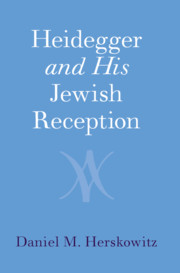Book contents
- Heidegger and His Jewish Reception
- Heidegger and His Jewish Reception
- Copyright page
- Dedication
- Contents
- Preface
- Acknowledgments
- 1 Herkunft and Zukunft: Heidegger, Christianity, and Secularization
- 2 Kant’s Legacy and New Thinking: Heidegger, Cassirer, and Rosenzweig
- 3 A Christian Anthropology? Early Jewish Readings of Sein und Zeit
- 4 Dwelling Prophetically: Martin Buber’s Response to Heidegger
- 5 The Destruktion of Jerusalem: Leo Strauss on Heidegger
- 6 God, Being, Pathos: Abraham Joshua Heschel’s Theological Rejoinder to Heidegger
- 7 Uprooting Paganism: Emmanuel Levinas Faces Heidegger
- Conclusion Which God Will Save Us? Heidegger and Judaism
- Bibliography
- Index
1 - Herkunft and Zukunft: Heidegger, Christianity, and Secularization
Published online by Cambridge University Press: 24 September 2020
- Heidegger and His Jewish Reception
- Heidegger and His Jewish Reception
- Copyright page
- Dedication
- Contents
- Preface
- Acknowledgments
- 1 Herkunft and Zukunft: Heidegger, Christianity, and Secularization
- 2 Kant’s Legacy and New Thinking: Heidegger, Cassirer, and Rosenzweig
- 3 A Christian Anthropology? Early Jewish Readings of Sein und Zeit
- 4 Dwelling Prophetically: Martin Buber’s Response to Heidegger
- 5 The Destruktion of Jerusalem: Leo Strauss on Heidegger
- 6 God, Being, Pathos: Abraham Joshua Heschel’s Theological Rejoinder to Heidegger
- 7 Uprooting Paganism: Emmanuel Levinas Faces Heidegger
- Conclusion Which God Will Save Us? Heidegger and Judaism
- Bibliography
- Index
Summary
Since the publication of the “earliest” Heidegger’s lectures and notes, it has become undeniable that the trajectory of his philosophy as a whole is thoroughly indebted to his Christian origins. Biographically, the young Heidegger was raised in a devout Catholic home in the rural town of Messkirch in Baden. As he came of age, he aspired to become a priest and began formation in a Jesuit seminary. While his quest for priesthood was cut short, Heidegger remained a passionate disciple of the Catholic faith, publishing polemical and apologetic pieces in various conservative Catholic journals and enrolling as a student of Catholic theology at the University of Freiburg. His initial philosophical training was in neo-Scholasticism and neo-Kantianism, and he wrote his dissertation on psychologism (1913) and his Habilitationsschift on “Duns Scotus’ Doctrine of Categories and Signification” (1915). Increasing dissatisfaction with the assumptions and efficiency of his philosophical commitments and his eventual marriage to the Protestant Elfride Petri in 1917 contributed to his estrangement from Catholicism and adoption of the Protestant confession.
- Type
- Chapter
- Information
- Heidegger and His Jewish Reception , pp. 1 - 47Publisher: Cambridge University PressPrint publication year: 2020

